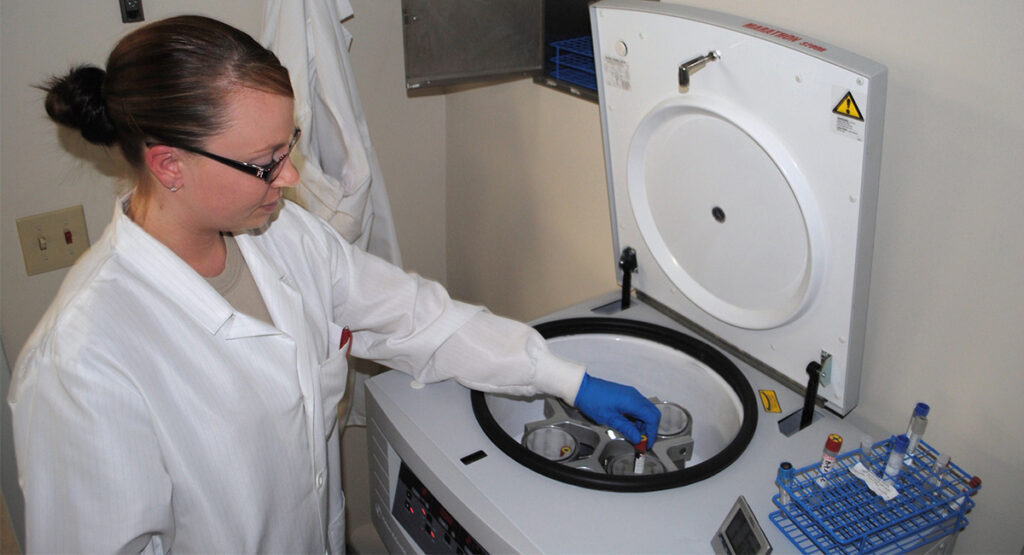
Are you looking for a specific centrifuge for your laboratory? A centrifuge is a motor-driven device commonly used in laboratories to separate components of a mixture (fluids, gas, or liquid) on the basis of their size, density, and the viscosity of the medium.
From different types to sizes and rotor speed, many variations of centrifuges are available in the market. So if you’re confused between all the options or want to know more about lab centrifuge devices, you’ve landed on the right page.
From biochemical, medical research, and clinical trials, centrifuges have many applications. They’re commonly used for different types of centrifuging applications such as sucrose gradient, differential, and isopycnic.
So how do these lab centrifuge machines work?
First, a sample is kept in a rotor that rotates it in a circle on a fixed axis. This results in a centrifugal strong force perpendicular to the axis of the spin. Due to this extremely strong force, all the heavy materials are pushed away to the outside of the vessel. This process is useful in purifying cells, subcellular organelles, viruses, proteins, and nucleic acids.
From micro centrifuges to high speed centrifuges, various types of the centrifuges are used for various purposes. Though they’re different, their work is mainly dependent on the principle of sedimentation.
Here are some of the different types of centrifuges commonly used in laboratories:
Table of Contents
1. Micro Centrifuge
Micro centrifuge is one of the staple instruments that many research laboratories have used for different biological applications. As the name suggests, they have a compact design consisting of small tube volumes such as 0.5mL, 1.5mL, 2mL PCR tubes.
In this type, the centrifuge spins at speed up to 16,000x g. However, some specialized ones can reach a speed of 30,000x g. With changing speed, some manufacturers also offer Microcentrifuge with tube adaptors and interchangeable rotors.
2. Benchtop Centrifuges
These centrifuges are known for their small bench space footprint. Commonly used in clinical and research laboratories, benchtop centrifuges are available with varying speeds. Maximum speed in RCFs of benchtop centrifuges usually ranges from a few hundred to over 50,000 x g, and tube volumes can range from under 1 mL to a few liters.
You can find different variations with rotors such as fixed angle, swinging bucket, and continuous flow. You can buy the one depending on the research and requirements.
3. Refrigerated Centrifuges
If you’re looking for a centrifuge on which you can put a sample at a consistent temperature, this will be the best one. Refrigerated centrifuges are ideal for used for samples that are temperature sensitive, animal or proteins, live cells, etc., and that’s why they’re commonly used for analyzing DNA, RNA, PCR, and antibodies.
Comes with adaptors and interchangeable rotors; Refrigerated centrifuges accommodate a wide range of sample volumes from under 1 mL to a few liters. Here the speed can also vary and reach up to 60,000x g, and the temperature range is between -20 and -40 degrees Celsius.
4. High Speed Centrifuges
As its name suggests, these centrifuges are operated at larger speeds. The speed usually ranges from 15,000 to 30,000 RPM. High speed centrifuges are used in various biochemical applications which require high-speed operations, such as gathering microorganisms, cellular debris, bigger cellular organelles, and ammonium
sulfate-precipitated proteins.
These centrifuges come with different adapters with various sizes and holding capacities so that they can accommodate sample tubes of various sizes and volumes.
5. Ultracentrifuges
Ultracentrifuges operate at extremely high speeds and can generate acceleration as high up to 1,000,000 g (150,000 RPM). The reason behind their working at such a high speed is to separate the smallest molecules like ribosomes, proteins, and viruses.
Ultracentrifuges are available in two types: Preparative Ultracentrifuges and Analytical Ultracentrifuges.
To sediment and separate biological/organic components such as DNA, RNA, lipoproteins, membranes, and organelles, Preparative Ultracentrifuges are used. On the other hand, Analytical ultracentrifuges are used to detect the equilibrium and velocity of sedimentation, the shape of molecules, and the mass of molecules. Apart from biochemical applications, ultracentrifuges are also used in many areas of nanotechnology.
Conclusion
So, this is all about the different types of lab centrifuges. Apart from these five, there are also other types of centrifuges that are used for different large-scale industrial and space applications. However, we’ve mainly focused on the lab centrifuges in this post.
So, purchase the centrifuge model according to its application and properties or as per your labware requirement.
Also, Read More About – Metrogyl 400? | can you get strep throat without tonsils | Cyclopam Tablet? | Maxtra Syrup